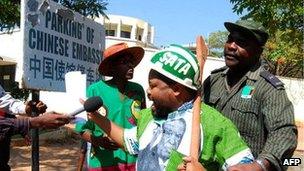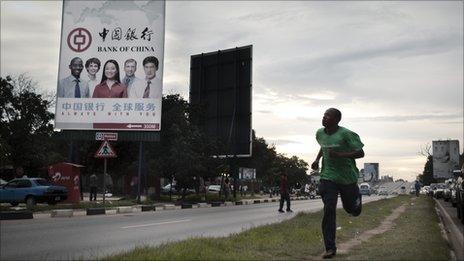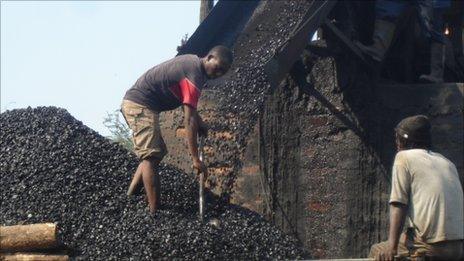China mines in Zambia 'unsafe' says Human Rights Watch
- Published

President Michael Sata has been very critical of Chinese-run mines
Chinese-run copper mines in Zambia are dangerously unsafe and owners routinely flout the rights of workers, says a report by Human Rights Watch (HRW).
The pressure group says miners are threatened with dismissal if they became involved in union activities.
It urged Zambia's new President, Michael Sata, to fulfil election promises and take decisive action against the owners.
The Chinese state company running the mines denied most of HRW's allegations.
Copper mining is one of Zambia's main industries, providing nearly three-quarters of the country's exports; many of the mining companies are foreign-owned.
'Misunderstandings'
The Human Rights Watch , externalreport entitled "You'll Be Fired If You Refuse": Labour Abuses in Zambia's Chinese State-owned Copper Mines, highlights "persistent abuses".
It said miners had to work 12-hour shifts often in fume-filled tunnels. Sometimes shifts were 18 hours long.
Zambian law limits shifts to eight hours.
The report said that despite improvements in recent years, safety and labour conditions at Chinese mines were worse than at other foreign-owned mines.
The state-owned China Non-Ferrous Metals Mining Corporation (CNM) runs four copper mines in Zambia.
In its response to the report, CNM said "language and cultural differences" could have resulted in "misunderstandings".
"China's significant investment in Zambia's copper mining industry can benefit both Chinese and Zambians," said Daniel Bekele, the Africa director at Human Rights Watch.
"But the miners in Chinese-run companies have been subject to abusive health, safety and labour conditions and longtime [Zambian] government indifference."
Many of the poor safety practices in Zambia's Chinese-run mines were strikingly similar to abuses at mines in China, he added.
A Chinese Foreign Ministry spokesman in Beijing, Hong Lei said the report did not accurately reflect conditions.
"The conclusions reached by Human Rights Watch are inconsistent with the facts," Mr Hong told reporters.
He said Chinese companies had brought great benefits to Zambia and that systems were in place to protect the safety and rights of workers there.
Booming trade
The report is based on interviews with 170 copper miners, more than half of whom worked for the Chinese companies.
Human Rights Watch found that pay at the Chinese-run mines was higher than Zambia's minimum wage, but much lower than that paid by other multinational copper mining firms.
The workers said they often had to buy their own safety equipment.
"Sometimes when you find yourself in a dangerous position, they tell you to go ahead with the work," one miner told Human Rights Watch.
"They just consider production, not safety. If someone dies, he can be replaced tomorrow. And if you report the problem, you'll lose your job."
Zambia's new President, Michael Sata, has been a longstanding critic of conditions in Chinese-run enterprises in Zambia.
But he toned down his anti-Chinese rhetoric in his last campaign, and since he was elected.
Chinese companies took over many Zambian mines after western investors pulled out following a collapse in copper prices.
Prices for Zambia's prime export have recently shot up, fuelled by Chinese demand.
China has invested more than $400m (£250m) in Zambia's mining industry, and Zambia earned $2.2bn from copper exports to China last year.
The total trade between the two countries last year was $2.8bn.
"Simply demanding that Chinese companies improve their practices is insufficient if not accompanied by more effective regulation of the mines," Human Rights Watch said.
- Published11 October 2011
- Published19 September 2011

- Published13 December 2010

- Published3 January 2018